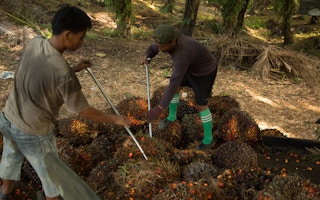Smallholder oil palm farmers in Malaysia have accused the European Union (EU) of creating a “crop apartheid” in the aftermath of a recently proposed ban on palm oil from biofuels.
In a massive protest action staged in Kuala Lumpur last week, the smallholders claimed that the planned ban on palm oil will threaten 650,000 farmers and over 3.2 million Malaysians who depend on the palm oil industry for their livelihoods.
The ire from Malaysian farmers was in response to a January 17 decision by European lawmakers to approve draft measures to reform its power sector in a bid to meet ambitious climate goals. Part of this move was cutting the use of palm oil in motor fuels by 2021.
Dato’ Haji Aliasak Bin Haji Ambia, president of the National Association of Small Holders (NASH), said the EU’s move violates every United Nations treaty Europe has signed up for, which includes bilateral trade agreements with Malaysia.
“We won’t forget neither will we allow this discrimination to continue,” Aliasak said.
“The proposed EU ban on palm oil biofuels, under the Renewable Energy Directive, is discriminatory and must be removed. Over 112,000 FELDA smallholders in Malaysia will be harmed by this ban,” Tan Sri Shahrir Abdul Samad, chairman of the Federal Land Development Authority (FELDA), said.
According to the Malaysian Palm Oil Board, the EU is Malaysia’s biggest export destination, accounting for 13 per cent of shipments of palm oil and palm-based products last year. About 90 per cent of Malaysia’s biodiesel exports also go to Europe.
Mah Siew Keong, Malaysia’s Plantation Industries and Commodities Minister, warned that such a resolution could be a major blow to the country’s exports. “Any form of discrimination is not acceptable, and we will be compelled to act if it’s enforced to protect our own interest,” he said.
“
Palm oil is still a leading cause of deforestation and this is a direct response to the industry’s failure to address the problem.
Octyanto Bagus Indra Kusuma, forest campaigner, Greenpeace Southeast Asia
While smallholders and government officials from Malaysia seethe, environmentalists and conservationists have lauded the EU’s move as a step forward towards curbing deforestation and climate change.
Greenpeace Southeast Asia forest campaigner Octyanto Bagus Indra Kusuma told Eco-Business that Greenpeace welcomes the EU’s proposal because biofuels made from palm oil, like other agricultural crops, only spur deforestation and are not a solution to climate change.
“The EU’s vote should be a wake-up call for the palm oil industry and governments of palm oil producing countries. Palm oil is still a leading cause of deforestation and this is a direct response to the industry’s failure to address the problem,” Bagus said.
As to the smallholder farmers whose livelihoods come under threat with the proposed ban, Bagus said that a responsible palm oil industry that protects forest and people is possible.
“The industry needs to help smallholders to produce more oil using less land and help them raise their income by providing them access to markets,” Bagus said.

















